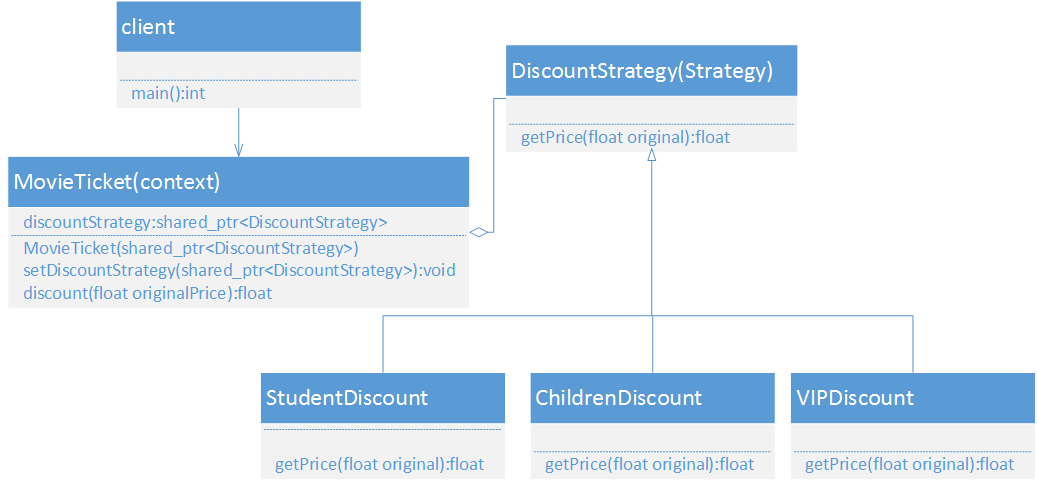1、作用
策略模式的主要目的主要是将算法的定义(strategy类)和使用分开(context类),也就是将算法的行为和环境分开,将算法的定义放在专门的策略类中,每一个策略类封装一个实现算法。而使用算法的环境中针对抽象策略编程,而不是针对实现编程,符合依赖倒置原则。
2、实现方式
策略模式包含以下3个角色:
(1)Context(环境类):负责使用算法策略,其中维持了一个抽象策略类的引用实例。
(2)Strategy(抽象策略类):所有策略类的父类,为所支持的策略算法声明了抽象方法。=> 既可以是抽象类也可以是接口
(3)ConcreteStrategy(具体策略类):实现了在抽象策略类中声明的方法。
比如要开发一个电影售票系统,将这个系统封装为MovieTicket类,售票系统要使用一些打折的策略,如果把这些打折的策略实现在MovieTicket类中,那么如果增加或者修改打折策略就需要修改MovieTicket类。使用策略模式,那么就把MovieTicket当做使用算法的类(Context类),而将策略抽象成一个DiscountStrategy类,MovieTicket类依赖于DiscountStrategy类进行编程,这样继承于DiscountStragegy类的具体策略类有修改或者新增不需要修改MovieTicket类。
优点:
这里主要的好处是对MovieTicket中使用的策略满足的开闭原则
缺点:
对于使用MovieTicket这个类的用户就不友好了,他需要具体有哪些策略,将策略的选择留给了用户,增加了用户代码的复杂度(扩展性、使用灵活性就要付出代付复杂的代价。)
这个例子对应的UML图:

3、C++代码
Discount.h
#include <iostream> #include <memory> // shared_ptr #ifndef __DISCOUNT__H__ #define __DISCOUNT__H__ using namespace std; class DiscountStrategy { // 策略的抽象基类,定义接口。有的像模板模式的模板,但模板模式定义死了一个模板函数。 public: virtual float getPrice(float originalPrice) = 0; }; class ChildrenDiscount : public DiscountStrategy { // 扩展的一种打折策略,小孩打折————免费。 public: float getPrice(float originalPrice) override { return 0; } ~ChildrenDiscount() { cout<<"distroy ChildrenDiscount..."<<endl; } }; class StudentDiscount : public DiscountStrategy { // 扩展的一种打折策略,学生打折————半价。 public: float getPrice(float originalPrice) override { return originalPrice * 0.5; } ~StudentDiscount() { cout<<"distroy StudentDiscount...."<<endl; } }; class VIPDiscount : public DiscountStrategy { // 扩展的一种打折策略,会员打折————8折。 public: float getPrice(float originalPrice) override { return originalPrice * 0.8; } ~VIPDiscount() { cout<<"distroy VIPDiscount...."<<endl; } }; class MovieTicket { public: MovieTicket(shared_ptr<DiscountStrategy> discount) : discountStrategy(discount) {} void setDiscountStrategy(shared_ptr<DiscountStrategy> discount) { discountStrategy = discount; } float discount(float originalPrice) { return discountStrategy->getPrice(originalPrice); } private: shared_ptr<DiscountStrategy> discountStrategy; }; #endif
test.cc
#include <iostream> #include <memory> #include "Discount.h" int main() { shared_ptr<DiscountStrategy> discountStrategy = make_shared<StudentDiscount>(); MovieTicket movieTicket(discountStrategy); // 在对电影票使用学生票的打折策略 double originalPrice = 100; double discountPrice = movieTicket.discount(originalPrice); cout<<"StudentDiscount: originalPrice="<<originalPrice<<", discountPrice="<<discountPrice<<endl; movieTicket.setDiscountStrategy(make_shared<ChildrenDiscount>()); // 在对电影票使用儿童票的打折策略 discountPrice = movieTicket.discount(originalPrice); cout<<"ChildrenDiscount: originalPrice="<<originalPrice<<", discountPrice="<<discountPrice<<endl; movieTicket.setDiscountStrategy(make_shared<VIPDiscount>()); // 在对电影票使用会员票的打折策略 discountPrice = movieTicket.discount(originalPrice); cout<<"VIPDiscount: originalPrice="<<originalPrice<<", discountPrice="<<discountPrice<<endl; return 0; }
输出:

在这个例子中,MovieTicket类要保存一个DiscountStrategy的一个指针,为了好管理指针,这里使用了智能指针,省去了指针的复杂管理。